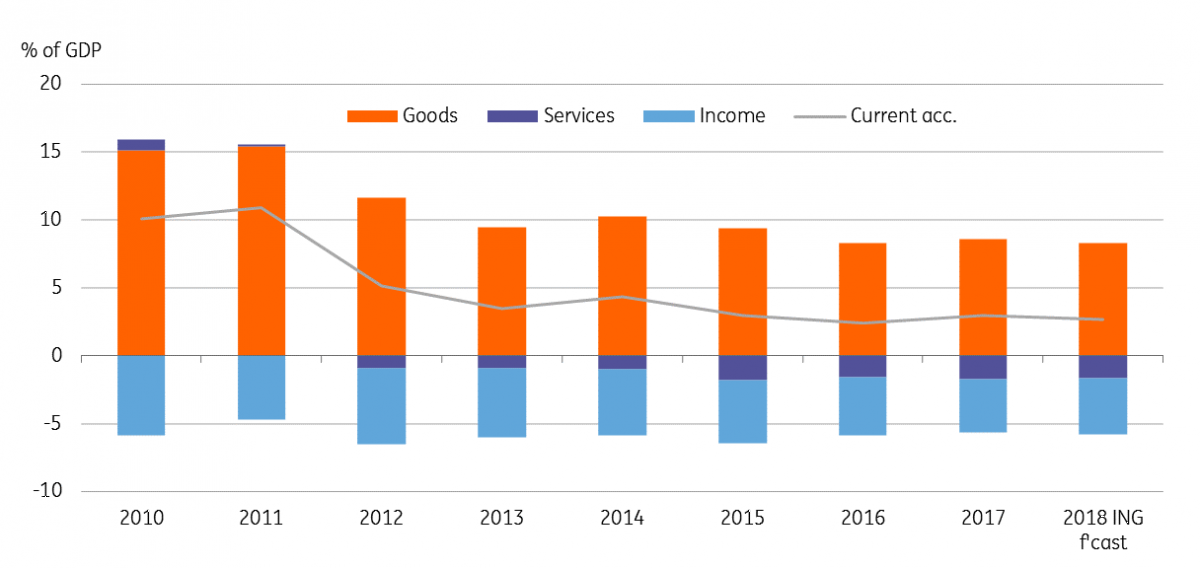Malaysia: A decade-high September trade surplus
Steady current account surplus is positive for the Malaysian ringgit (MYR) but the macro policy mix, an overly loose fiscal policy, and stable central bank (BNM) monetary policy until after 2019, has turned negative. We consider our end-year USD/MYR forecast of 4.20 subject to upside risk
| MYR 15.3bn |
September trade surplusThe highest in 10 years |
| Higher than expected | |
Weak imports boost trade surplus
Malaysia’s trade surplus surged by almost a factor of ten to 15.3bn Malaysian ringgit (MYR) in September from MYR 1.6bn in August. The figure is just shy of the MYR15.4bn record level hit a decade ago in September 2008.
This result stems from unexpectedly weak imports. The 2.7% year-on-year import contraction in September was a sharp negative swing from over 11% growth in the previous month and contrasts with expectations for a 10% increase. Electronics and electricals, machinery and transport equipment, metals, and textiles were the main drags.
After a dismal performance in August, exports bounced back in September with 6.7% YoY growth - spot on the consensus estimate (ING forecast 6.5%) and up from August’s -0.3% decline. Oil-related exports were the main drivers with a 21.1% surge, while electronics growth improved to 6.5% from 3.2% in August.
The cumulative trade surplus of MYR 85.8bn in the first nine months is MYR 15.6bn wider on the previous year, while the year-to-date export and import growth rates of 6.3% and 4.7% respectively have slowed sharply from their year-ago pace.
The trade surplus drives Malaysia's current account surplus. The official forecast of the current surplus of 2.5-3% of GDP in 2017 is on track (ING forecast 2.7%, 2017 actual 3%).
Steady current account surplus

The MYR-unfriendly policy mix
A steady current account surplus is positive for the MYR, but weakening public finances are negative. Unveiled in the 2019 Budget last Friday, the government’s projection of unexpectedly big fiscal deficits of 3.7% of GDP in 2018 and 3.4% in 2019 represent a significant U-turn on fiscal consolidation, which will be viewed negatively by investors.
And with slowing GDP growth and persistently low inflation, there is no pressure on the central bank (Bank Negara Malaysia) to change the policy at the upcoming meeting this week (8 November). Nor do we anticipate any change to the 3.25% overnight policy rate until after 2019.
Such a macro policy mix of an overly loose fiscal policy and stable monetary policy is negative for the MYR, even as the currency should continue to benefit from firmer crude oil price and a healthy external payments position. We consider our end-2018 USD/MYR forecast of 4.20 subject to upside risk.
"THINK Outside" is a collection of specially commissioned content from third-party sources, such as economic think-tanks and academic institutions, that ING deems reliable and from non-research departments within ING. ING Bank N.V. ("ING") uses these sources to expand the range of opinions you can find on the THINK website. Some of these sources are not the property of or managed by ING, and therefore ING cannot always guarantee the correctness, completeness, actuality and quality of such sources, nor the availability at any given time of the data and information provided, and ING cannot accept any liability in this respect, insofar as this is permissible pursuant to the applicable laws and regulations.
This publication does not necessarily reflect the ING house view. This publication has been prepared solely for information purposes without regard to any particular user's investment objectives, financial situation, or means. The information in the publication is not an investment recommendation and it is not investment, legal or tax advice or an offer or solicitation to purchase or sell any financial instrument. Reasonable care has been taken to ensure that this publication is not untrue or misleading when published, but ING does not represent that it is accurate or complete. ING does not accept any liability for any direct, indirect or consequential loss arising from any use of this publication. Unless otherwise stated, any views, forecasts, or estimates are solely those of the author(s), as of the date of the publication and are subject to change without notice.
The distribution of this publication may be restricted by law or regulation in different jurisdictions and persons into whose possession this publication comes should inform themselves about, and observe, such restrictions.
Copyright and database rights protection exists in this report and it may not be reproduced, distributed or published by any person for any purpose without the prior express consent of ING. All rights are reserved.
ING Bank N.V. is authorised by the Dutch Central Bank and supervised by the European Central Bank (ECB), the Dutch Central Bank (DNB) and the Dutch Authority for the Financial Markets (AFM). ING Bank N.V. is incorporated in the Netherlands (Trade Register no. 33031431 Amsterdam).